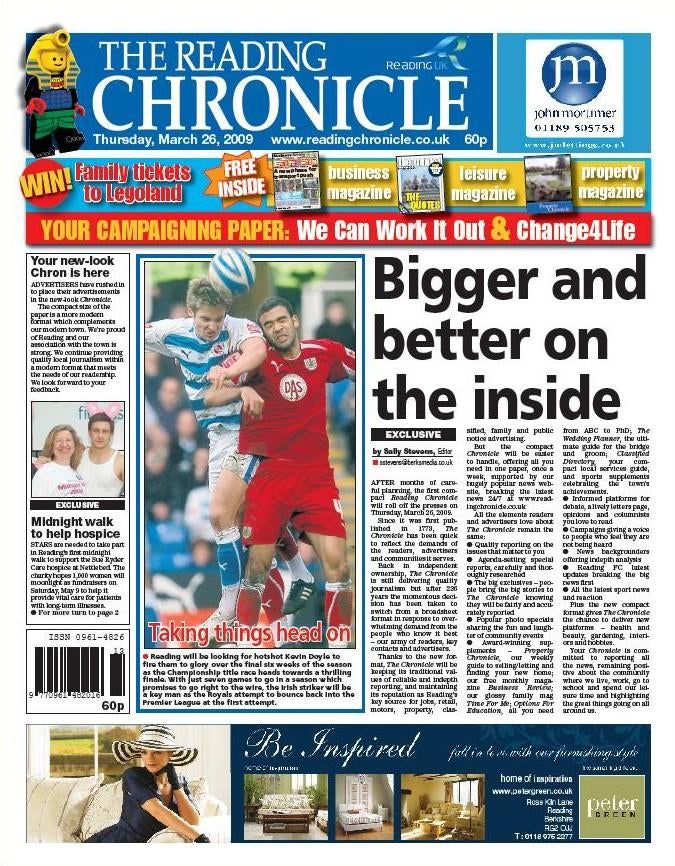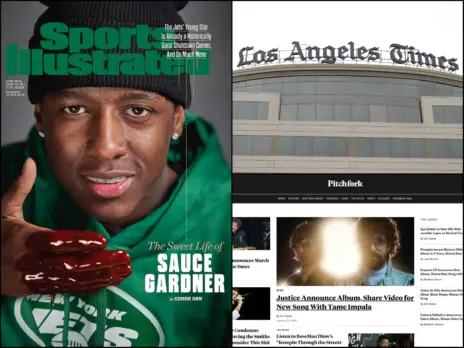
This month, three broadsheet newspapers have announced they are turning tabloid – the Belfast Telegraph, the Darlington and Stockton Times, and the Reading Chronicle.
Those titles are following a trend: the Birmingham Post downsized in August, while The Northern Echo, Oxford Times, Wakefield Express, Halifax Courier and others shrunk in 2008 and 2007.
So are there any regional broadsheets left? The answer, believe it or not, is yes.
In England and Wales, the only regional daily broadsheet is the Yorkshire Post. But, according to the Newspaper Society’s database, 44 weekly broadsheets remain.
One of them is the Barnsley Chronicle, a rarity in English newspapers: broadsheet, independently-owned, and printed in the town it serves.
Editor Robert Cockroft told Press Gazette there were no plans to downsize soon.
“We have thought about it, but never for terribly long,” he said.
“There are probably a number of reasons. One, it’s quite distinctive. There are so many papers that are tabloid, so if you have a broadsheet, for matters of display, it tends to stand out – and we have a large masthead.
“It’s quite practical for folding in supplements. We have a lot – classified, property, various supplements [in tabloid] and they’re easy to slip in the main paper. Otherwise it can make a tabloid really quite bulky.
“I’ve nothing against tabloids – there are some excellent ones. But broadsheet seems to go down well, and the readers seem to like it. There’s possibly still a touch of authority about a broadsheet, and readers seem to like it.”
Not all readers, however.
“We recently got a letter from a 10-year-old girl in Penistone saying the paper’s too big to read, and can we go tabloid,” said Cockroft.
“Where in journalism you never rule anything out, going tabloid in the next year would be unlikely.”
‘Difficult to handle’
When the Belfast Telegraph went totally tabloid, its editor Martin Lindsay said commuters were paramount.
“The feedback we got is the broadsheet format is a difficult paper to handle,” he said. “People have busier lifestyles these days, they are always on the move.”
But Cockroft said his paper is not often read in transit.
“Lots of our readers pick it up on Friday, read it at home, and put it on the kitchen table where they want to read it,” he said.
Simon Veitch, managing director of the Cumberland and Westmorland Herald – an independently-owned, full colour, paid-for weekly broadsheet – said his paper, also, is often read at home.
“We publish on a Saturday,” he said. “It’s not as if our readers will be sitting on a train or bus to work, reading the paper.”
Veitch said, like in Barnsley, downsizing had been considered. But recent market research, done independently, discovered most readers in their patch prefer broadsheet.
So do broadsheets have innate authority?
“I think The Times probably bucked that trend in national papers when it went broadsheet,” said Veitch.
“But there’s still something there that’s how newspapers were in the olden days, something appealing.
“It’s a judgment based on the area you’re in – if we were in a city, we would probably have gone tabloid, but not here.”
Indeed, the Newspaper Society’s list of English and Welsh broadsheets has just one city paper – the Lancaster Guardian. The rest are from town and country: the Berwick Chronicle; Hexham Courant; Northumberland Gazette.
In Scotland, the story is slightly different. The Herald in Glasgow is still broadsheet, as is the Press and Journal in Aberdeen. They’re joined by 12 other papers, from the John O’Groat Journal to the Southern Reporter, based in Selkirk.
What sales figures prove, though, is changing size provides – at least – a short-term sales boost.
Nationally, The Times, The Independent and The Guardian all shot up after downsizing. The Northern Echo was the country’s best-performing regional paper, with a 0.8 per cent paid-for fall, after it went tabloid.
Can, for example, The Herald – down 9.95 per cent in February, according to ABC – ignore the quick-fix much longer? Readers, as ever, will decide.
Email pged@pressgazette.co.uk to point out mistakes, provide story tips or send in a letter for publication on our "Letters Page" blog







